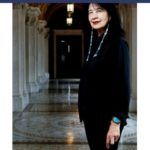Per The Library of Congress, the Poet Laureate originated in 1936 when Archer M. Huntington created an endowment for the “maintenance of a chair of Poetry of the English language in the Library of Congress.” The title was originally “Consultant in Poetry to the Library of Congress,” and changed to “Poet Laureate Consultant in Poetry” in 1986. The Library of Congress doesn’t ask a lot of their Poet Laureates, largely “to afford each incumbent maximum freedom to work on his or her own projects while at the Library.” Poets need time to contemplate life, beauty, existence, and language. They have to go off into their corners to battle with their inner demons and lash them into lines and stanzas. The Library of Congress knows this, so they keep the official duties to just three items:
Give a reading or presentation to inaugurate their term. Select and introduce the two Witter Bynner Fellows at their Library of Congress reading. Give another reading or presentation to close their term.
Those are the official duties. Unofficially, however, is where the Poet Laureate shines. In the case of Joy Harjo, her primary focus has been on “Living Nations, Living Words: A Map of First Peoples Poetry.” She is working with the Library of Congress’s Geography and Map Division to create “a web mapping application geared toward storytelling, to showcase contemporary Native American poets from across the country.” The Library of Congress is using this project to create a new collection in their American Folklife Center featuring biographies and recordings of Native American poets. Previous Poets Laureate have spearheaded their own projects while serving the Library of Congress:
Billy Collins established the website Poetry 180 to provide students one poem per day during a regular school year. Robert Hass created the Watershed Environmental Poetry Festival. Juan Felipe Herrera was a perpetual overachiever during his two terms, creating La Casa de Colores, The Technicolor Adventures of Catalina Neon, Wordstreet Champions and Brave Builders of the Dream, and Laureate Lab—Visual Wordist Studio in his hometown. Natasha Trethewey created a series of reports for PBS called Where Poetry Lives, exploring societal issues through poetry.
Still other Poets Laureate have used the time and stipend to focus on their own writing as much as possible, while still serving as the nation’s most visible advocate for poetry. Joy Harjo isn’t the only Poet Laureate in the U.S., either. Most states (all but Idaho, Massachusetts, New Jersey, and Pennsylvania) also recognize poets to serve as Poet Laureate, though their official duties are usually rather vague. Missouri, for instance, says their Poet Laureate “enriches Missourians’ lives throughout the state by fostering the reading and writing of poetry, through public appearances, readings, workshops, and digital and social media.” The Youth Poet Laureate program, established and managed by Urban Word, recognizes young poets across the country and awards national recognition to one poet each year. The annual Youth Poet Laureate doesn’t serve a term or have responsibilities like their adult counterparts, but rather is recognized for their work and awarded all-expenses paid trips to the National Youth Poet Laureate Commencement and a writing retreat, plus artwork featuring their poetry and likeness. More than anything, Poets Laureate—national, local, or youth—are advocates for poetry. The create and encourage others to forge the next great stanza, the next fierce enjambment, and the next nonce form every poet is trying to replicate.
